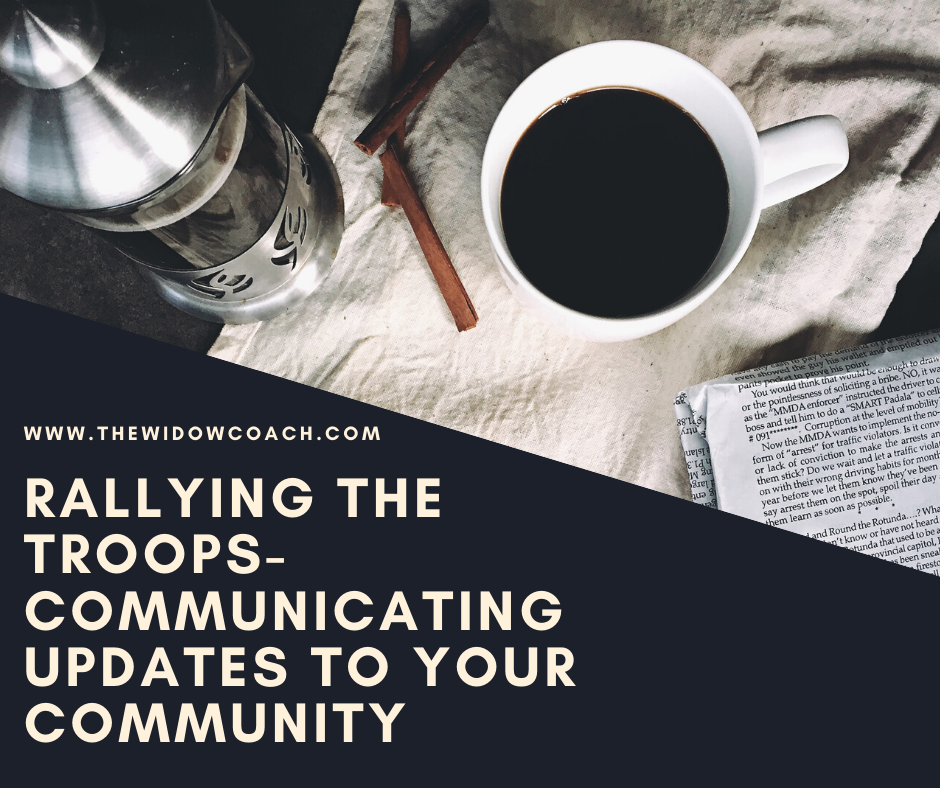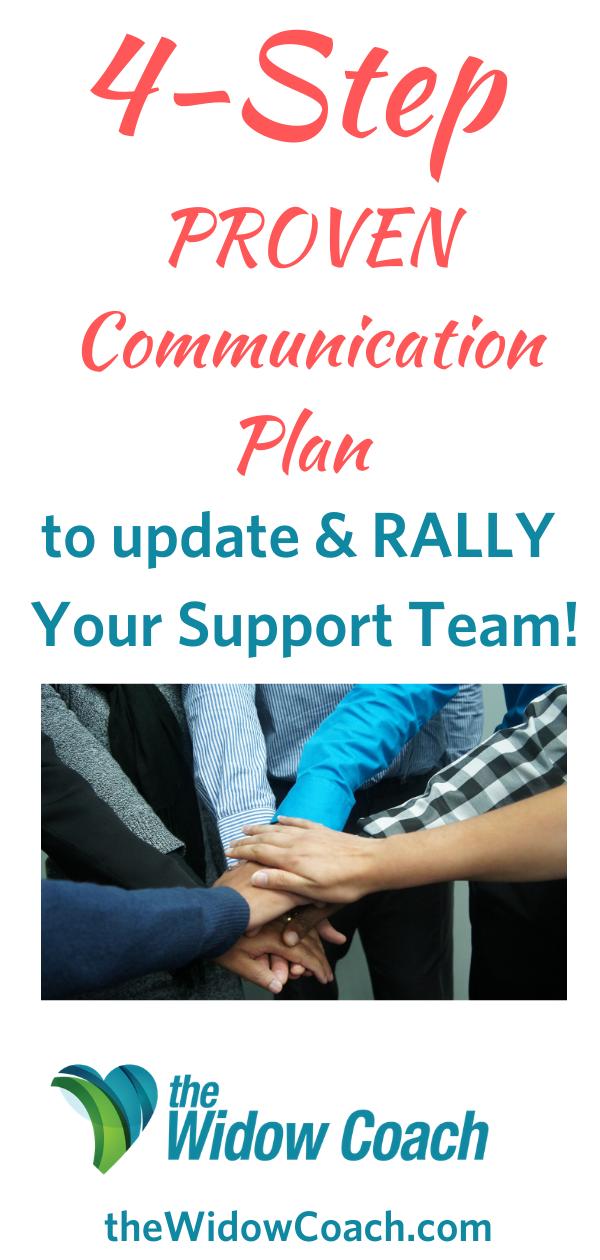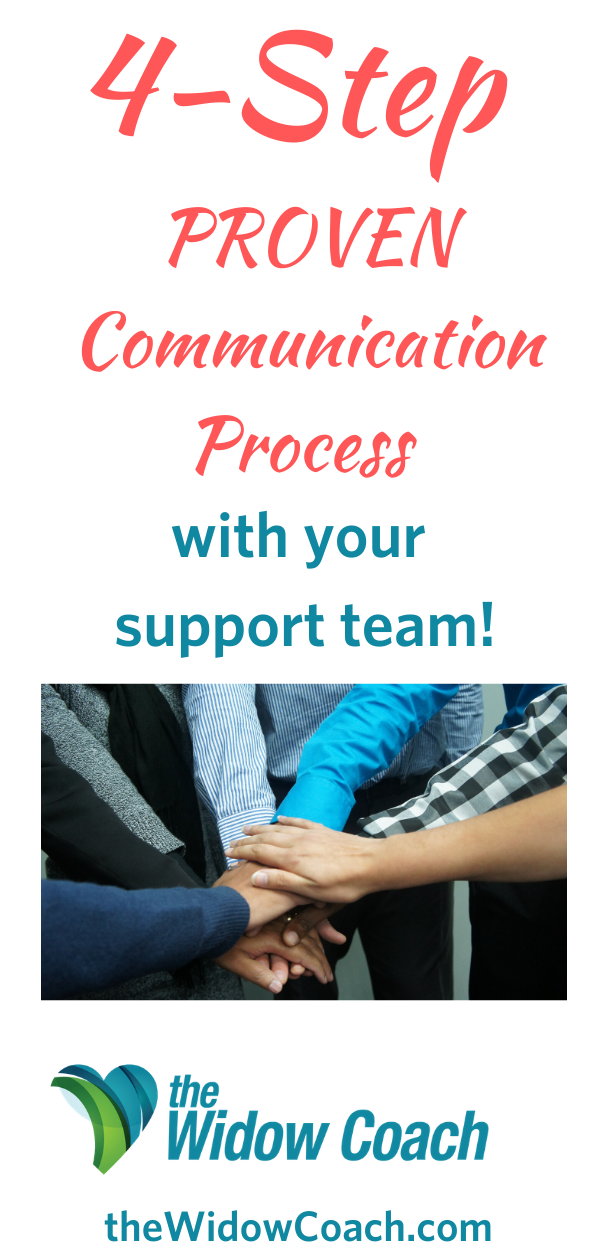
19 Feb Rallying the Troops: Communicating with Your Care Community when Widowed or in a Crisis
~Maggie Moore, The Widow Coach™ www.thewidowcoach.com
“When we are in crisis, the last thing we want to do is communicate. But it is the first thing that brings help into our world.”
-Maggie Moore, the Widow Coach™
When my husband was killed in a car accident, our world detonated. I was overwhelmed with my own grief and caring for my young son. I couldn’t trust what was coming out of my mouth because I couldn’t trust what was going on in my head. And yet, everyone kept asking me the question that I hated to answer. They looked at me with fear and pity in their eyes, lean in, and almost whisper, “How are you doing?”
Caregiving is the hardest act of love. And for people to enter our world to provide care and assistance is an act of recognition, to potentially face the “what if” that haunts them. We are equal parts “halo and horror”™ for them to see what could happen. They can exit it, they have a back door by going home, but they are confronted with the fact that we cannot-this is our reality and we need care and help. Moreover, they are providing us help and caring, meals and transportation, often in spite of what is going on in their own lives to enable ours to go on.
So, why should you communicate with these people who are helping you at this time of crisis? How should we do it? And what should we say?
Step one: Deal with “the Real”™
“The Real” is what you are actually facing, plus your feelings about it, unvarnished and uncensored. For me, with the agonizing, unimaginable pain of losing my soul mate and having my life and dreams detonated in a single moment on the highway and the agony my son and step-daughter faced at losing their father. Close on that was the loss the rest of the family was feeling, loss of a son, a brother, a cousin. I couldn’t handle anything beyond that.
Because our culture has a non-existent understanding of how to deal with and process grief and loss, “the Real” is very difficult, almost impossible for others to “get” if they have not been through it.
Safe Deposit Boxes for “the Real” are: a journal, a qualified therapist, a qualified grief or support group, or someone who has been through this and is emotionally capable to provide the support.
Do NOT deposit them in your caregiving communications. Recognize that the further you get away from the initial communication of the event that triggered the caregiving need, the less that people will be able to process “the Real” reactions. We understand grief at a funeral or a diagnosis, but further out there is a hope/wish/expectation that you will find a way to deal with this and become who you were.
Step two: Decide how you will “get the word out”
Most communicators say start with the message, then look at how to get it out. For those in a caregiving situation, starting with the tools first is a confidence-building process: Can I get the word out on a caregiving site so I can post an update to everyone at once (a website like www.carecalendar.org supports this)? Will I use a social app (like Facebook)? Do I need someone to help me manage this tech?
Posting updates is exhausting-limit yourself to one or two channels to thank your caregiving community. Better yet, select one channel and have a friend assist you by cross-posting, or use a tool like IFFT (If this, then that) which will help you do that automatically.
Never-Break Rules of Communicating from The Widow Coach™:
- Rule one: Never communicate or post out of anxiety, anger, fear, or overwhelming grief.
- Rule two: Never break rule one.
- Rule three: Always let your communications sit for a day.
Step 3: Determine how often you will update people
Communities of care are built and maintained on a two-way interaction: giving and receiving. Heartfelt gratitude unlocks grace in others. By acknowledging the giver, you help recognize the time and effort people made to help you and create the opportunity that they will want to continue. If people don’t know when an update is coming (weekly? Twice a week? Daily?) they may make assumptions and start to pull away if those expectations are unmet-and that is the last thing you want. But since you may not be up to it because of grief and exhaustion, you can do it on a weekly basis, when you are quiet and at your best to communicate.
Tip: You can have others help you write thank-you notes or emails and you just sign them.
Step 4: “Sandwich” your Updates: Communicate opportunities/victories, sandwich challenges and always end with acknowledgement.
I always work with people to “sandwich” communications. Our friends, family and co-workers want to cheer us on-it is human nature, but we can’t always talk that way.
I got in the habit of “sandwiching” my updates to my support community. First, I would open them with a win/story of my son and I or a memory of my husband. Next, I would communicate a caregiving update (how we were doing and if we had a need) and then end with a general or specific acknowledgement of a group or individual for supporting us. It allowed me to be honest, but also allow our community to be our heroes while they helped us to help ourselves. Even today, I am deeply grateful for the people in my caring community.
Tip: Form a template for your updates. If you want one, get on my mailing list at www.thewidowcoach.com by sending a request to info@thewidowcoach mentioning this blog post and we will send you one.
Remember, what you recognize, you receive more of, even in caregiving. When you recognize people who form your caregiving community, they will surprise you with their generosity. And one day, in some small or large way, it will be your turn to help and pay it forward.
Maggie Moore, The Widow Coach™
______________
About the author: Maggie Moore, The Widow Coach™ is a Certified Grief Recovery Method Specialist™, Widow, and Coach. She specializes in taking clients from “desolation to transformation” via her Widowed Navigator™ system, teaches a full suite of grief recovery classes, is a sought-after speaker for groups and professional certification, and consults with businesses affected by loss. You can reach her at [email protected]





No Comments